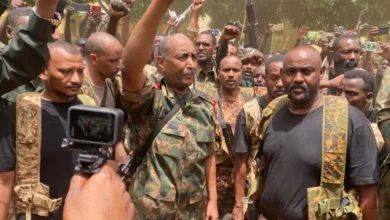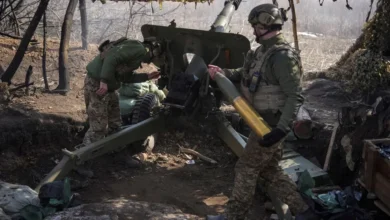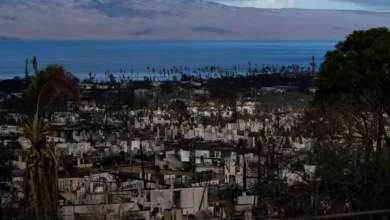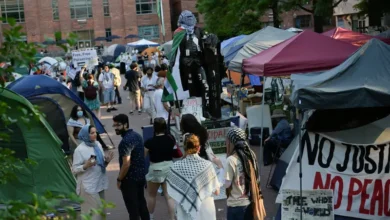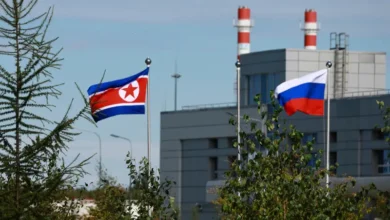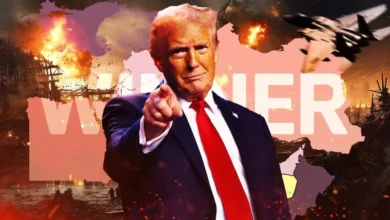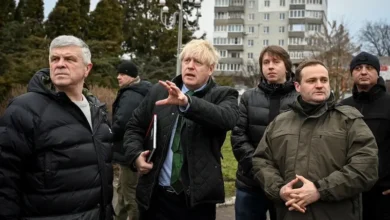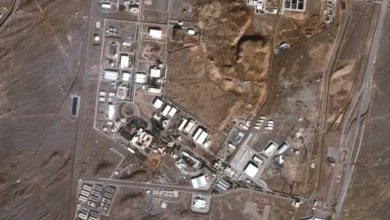India election results: Did ‘secular’ parties let Muslims down too?
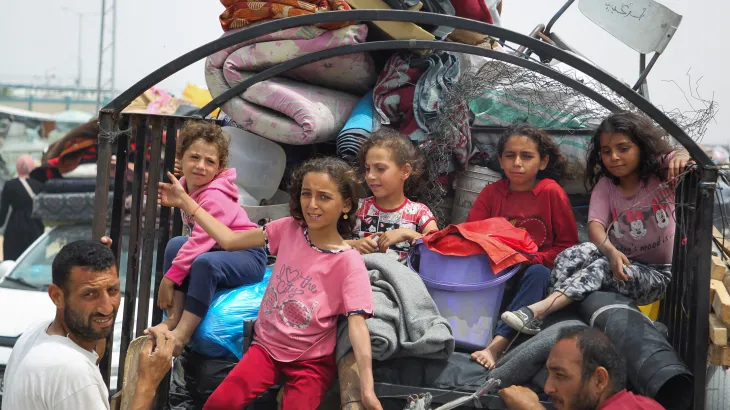
As Indian opposition leader Rahul Gandhi addressed journalists after election results demonstrated a dramatic setback for Prime Minister Narendra Modi’s ruling Bharatiya Janata Party (BJP), he held up a pocket-sized version of India’s Constitution.
“It was a fight to save the constitution. I would like to thank everybody who has participated in this election. I am proud of the people who resisted the onslaught on this constitution,” Gandhi said on Tuesday evening.
“It’s the poor and marginalised people who came out to save the constitution. Workers, farmers, Dalits, adivasis [Indigenous] and backwards have helped saved this constitution.
“This constitution is the voice of the people. We stand with you and fulfil the promises.”
Missing from the list of people Gandhi thanked were India’s 200 million Muslims, the country’s largest religious minority. Muslims are believed to have overwhelmingly voted for Gandhi’s INDIA alliance, which won 232 seats in the elections for the Lok Sabha, the lower house of parliament — below the halfway mark of 272 but significantly more than exit polls had predicted. Modi’s BJP won 240 seats, falling short of a majority on its own and leaving it dependent on allies to form a government for the first time since Modi came to power in 2014.The BJP with its Hindu majoritarian ideology has lost seats while avowedly secular opposition parties have gained ground. But the incoming parliament will have one of the lowest number of Muslim MPs – 22 – since independence.
Opposition avoids using word ‘Muslim’
The leaders of the opposition Indian National Developmental Inclusive Alliance (INDIA) did criticise Modi for bringing religion into his campaign. But analysts and many within the Muslim community point out that the opposition largely avoided raising Muslim concerns.
Dozens of Muslims have been lynched over accusations of cow smuggling as their food choices and public prayers have come under attack from vigilantes. Governments in several BJP-ruled states have enacted laws to prevent interfaith marriage – pandering to the conspiracy theory of “love jihad”, which suggests, without evidence, that Muslim men try to marry non-Muslim women to convert them to Islam.
And in 2020, India’s capital, New Delhi, witnessed riots in which at least 53 people were killed, most of them Muslim.
The Congress party and its alliance partner the Aam Aadmi Party (AAP), which governs Delhi, were silent on justice for the victims of those riots during the campaign – a sore point for people like Nisar Ahmad, a resident of Mustafabad in East Delhi.The 50-year-old ran a thriving garment business before the riots, but that was shut down due to threats from his Hindu neighbours, and he was forced to sell his house in East Delhi’s Bhagirathivihar because he was worried about his safety there after the riots.
Ahmad, who is one of the witnesses in court cases related to the Delhi riots, said he cannot forget how his neighbours were beaten, stripped and killed. “For me, everything has changed since the riots. I still feel unsafe in my own country,” he said.
“No one is talking about Muslims. The politicians fear if they use the word Muslim in their campaigns, it might hurt their vote bank,” Nisar said, referring to the opposition’s reluctance to discuss issues important to Muslims in campaign speeches. “I have voted and still hope somewhere that things might change.”
Others echoed his sentiments in Jamia Nagar, another Muslim neighbourhood in South Delhi.
Muslims portrayed as a threat
Irfan Ahmed, a professor of anthropology at Ibn Haldun University in Istanbul, questioned the often touted description of India’s elections as the largest festival of democracy. “For those denied justice and dignity, it may look like the world’s biggest circus,” he said.
“Since 2014, this electoral circus has passionately been staging Muslims as a threat against which people are asked to vote,” Irfan told Al Jazeera. “While the BJP issues the threat openly, the non-BJP parties do implicitly: That is by remaining silent.”
No party, he said, “has the courage to talk about the violence done to the Muslims”.
Al Jazeera spoke to several Muslims across India who shared the same sentiment.
Guru Prakash Paswan, a spokesperson for the BJP, denied his party was against minorities. Instead, he accused the opposition of playing “divisive politics.”
“As far as the BJP is concerned, we never distinguish or discriminate on the name of religion. We follow the principles of non-discrimination guaranteed under the constitution. Like our PM says, ‘Sab ka sath, sab ka vikas, sab ka Vishwas’ [‘Everyone’s support, everyone’s development, everyone’s trust’] is our motive,” he told Al Jazeera.
But the reality feels very different for many Indian Muslims. And it is not just the BJP that they blame.
Dwindling Muslim representation
Parties belonging to the INDIA alliance gave fewer tickets to Muslim candidates this time than they did in 2019 at a time when Muslim representation in parliament was already at its lowest since independence in 1947.
Non-BJP parties gave 115 tickets to Muslims in 2019, but the newly formed INDIA alliance fielded only 78 Muslims this year. The Lok Sabha has 543 seats.
In Maharashtra state with a population of 10 million Muslims, non-BJP parties did not give a single ticket to Muslims while in Uttar Pradesh state, home to 40 million Muslims, the state’s main opposition Samajwadi Party (SP) fielded just four Muslims. The SP has long counted Muslims among its core voters.
The Bahujan Samaj Party, a pro-Dalit party, fielded 35 Muslims across India, including 17 in Uttar Pradesh.
In Bihar state, the Rashtriya Janata Dal, part of the INDIA alliance, gave tickets to two Muslims. The state has 20 million Muslims while four out of 20 of the Communist Party of India (Marxist) candidates in Kerala were Muslims. One-fourth of the state’s population is Muslim.
The Trinamool Congress party, which governs West Bengal state in eastern India, fielded six Muslims, including five in West Bengal. One-third of the state’s nearly 100 people are Muslims.
Most of Muslims won from constituencies with substantial Muslim populations.
Historically, Muslim representation in the legislature has been low, but it has declined since the rise of the BJP in the 1990s. In the outgoing parliament, 27 MPs were Muslims.
“Addressing the question of representation is a bit complicated in a country which has one of the largest clusters of billionaires while at the same time is home to the largest numbers of poor people in the world,” said a professor of political science at New Delhi-based Jamia Millia Islamia University who wished to remain anonymous.
Averting Hindu consolidation
The BJP fielded just one Muslim candidate this year, and none of its 302 members in the outgoing parliament is Muslim.
Paswan, the BJP spokesman, defended his party, saying it works for all communities.
While the INDIA alliance has been cool towards Muslim parties such as the All India Majlis-e-Ittehadul Muslimeen (AIMIM), based in the southern city of Hyderabad, and the All India United Democratic party, based in the northeastern state of Assam, it has not hesitated to include outright Hindu parties.
The Shiv Sena (Uddhav Balasaheb Thackeray), based in Maharashtra, is led by the son of Balasaheb Thackeray, who was accused – though never formally charged – with instigating anti-Muslim violence in Mumbai in the early 1990s. Today, the party is a part of the INDIA alliance although it still has a Hindu majoritarian agenda.
Shama Mohamed, a Congress spokesperson, defended the party’s stand on minorities.
“We will ensure that the minorities receive their fair share of opportunities in education, healthcare, public employment, public works contracts, skill development, sports and cultural activities without discrimination.
“We will respect and uphold the fundamental right to practise one’s faith and the rights guaranteed to religious minorities under … the constitution.”
‘Muslim’ missing from manifestos
An analysis of the manifesto of the Congress party, Samajwadi Party, Rashtriya Janata Dal, Trinamool Congress party, Dravida Munnetra Kazhagam and Communist Party of India (Marxist) – all major opposition parties – shows that most of them did not use the word Muslim and stayed away from issues facing the community.
The Samajwadi Party coined a new catchline for the campaign: Pichhda, Dalit and Alpasankhyak (Backward, Dalit and minorities) in an attempt to get rid of its pro-Muslim image.
The party manifesto as well as the speeches of its top leader, Akhilesh Yadav, steered clear of topics concerning Muslims such as extrajudicial killings and the use of bulldozers to demolish Muslim homes and businesses.
In neighbouring Bihar state, the regional Rashtriya Janata Dal party also tried to change its pro-Muslim image. It coined a new catchphrase to expand its base beyond the Muslim and Yadavs, an unprivileged caste Hindu group. The party’s main leader, Tejasvi Yadav, tried to underplay the Muslim connection, pointing out that his party stood for all young people in one of the poorest states in India. Youth employment was his biggest election focus.
The Congress party, which leads the INDIA alliance, also avoided using the word Muslim in its manifesto. Its focus has been social equity and representation of unprivileged caste Hindus in jobs and other government institutions.
In 2018, former party leader Sonia Gandhi said Congress needed to shed the notion that it was a pro-Muslim party.
In its manifesto, the party also did not mention the government’s repeal under Modi of Indian-administered Kashmir’s semiautonomous status in 2019 and stayed silent about attacks against Muslims.
Meanwhile, the Aam Aadmi Party launched a website AAPKaRamRajya.com before the elections to showcase its work – in effect mirroring the BJP’s longstanding promise to turn India, officially a secular nation, into Ram Rajya (kingdom of Lord Ram).
In West Bengal, the ruling Trinamool Congress party promised in its manifesto to abolish a citizenship law that was enacted in 2019 and that many critics say discriminates against Muslims. The Trinamool Congress also committed to not implementing a uniform civil code, a policy pushed by the BJP that would end personal laws that allow Muslims and other communities to follow their traditional customs and practices when it comes to marriage inheritance and other civil matters. Still, the party manifesto did not mention the word “Muslim”.
Analysts say the BJP’s Hindu majoritarian push has made Muslim issues disappear from public discourse.
Mohammad Reyaz, an assistant professor at Aliah University in the eastern city of Kolkata, said the silence of so-called secular parties on Muslims, while disappointing, is not surprising – in part because they knew the community would not vote for the BJP in any case.
Not all are silent
To be sure, not all political parties have been silent.
The Dravida Munnetra Kazhagam (DMK), which governs the southern state of Tamil Nadu, and the Communist Party of India (Marxist) (CPM), which has been in power in neighbouring Kerala since 2016, mentioned Muslims in their manifestos.
The DMK promised to repeal the contentious citizenship law and grant job reservations to Muslims. The party also criticised the revocation of Kashmir’s special status. The CPM is also committed to restoring Kashmir’s special status, Mariam Alexander Baby, a party leader, said.
The CPM’s manifesto specifically talked about attacks against Muslims and promised to ban vigilante groups. It talked about compensation to Muslims who have been wrongfully jailed under a series of laws, including “anti-terror” laws.
